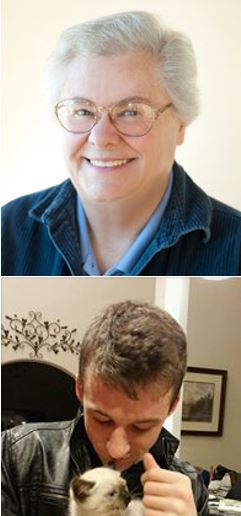Accepting the Reality of Our Ignorance
In February 1989, I defended my dissertation on “AA, Spiritual Issues, and the Treatment of Lesbian and Gay Alcoholics” in which I traced the competing trends of individualism and perfectionism from the colonial period to 1935. I argued that Alcoholics Anonymous was successful, in part, because it was able to marry these two trends. I then analyzed the effect of the God talk in AA using lesbians and gay men as a model.
After successfully defending my dissertation, Dr. Mary Lea Schneider presented “Dr. Berg” to my friends, family, and colleagues who had attended my defense. It was an exciting moment both academically and personally.
After Dr. Schneider introduced Dr. Berg, I headed across the street with my family, friends, and colleagues to the Peanut Barrel where we threw our peanut shells on the floor while waiting to be served great sandwiches. Later that evening, I had a party at Castellani’s Market, one of the first coffee shops in East Lansing, where my guests were treated to an open bar and enjoyed a latte or cappuccino or one of the other new types of coffee drinks which were not as common in 1989 as they have become in the twenty-first century.
On the day I defended my dissertation, I had the rare experience of knowing that I knew more than anyone else in the world on my topic. No one—anywhere—including the talented professors with whom I had studied, knew more than I did concerning my area of research.
Too often, newly minted PhDs stop there. We like the feeling of being the celebrated expert and desire to remain the celebrated expert. We cling to the illusion that we can hold onto the excitement of knowing more than anyone else. Faculty members who must feed their desire to remain the most knowledgeable person in the room are ill equipped to design a class centered on their students instead of themselves.
Fortunately, the act of defending my dissertation also provided the antidote that can keep me from clinging to the sense of self-importance that I felt on the day I knew more than anyone else in the world concerning my research. That antidote is to realize the extent of my ignorance. In the grand scheme of knowledge, “AA, Spiritual Issues, and the Treatment of Lesbian and Gay Alcoholics” is pretty insignificance.
As professors interested in developing student centered classes, we must first accept the reality of our ignorance and allow each student to become a content expert who can be—at various points during the semester—the most knowledgeable person in the room.
This is no false modesty. If I did not have confidence in my abilities, I would be too threatened by students discovering that I was not the all-knowing Dr. Berg who, one day almost 30 years ago—for the only time in his life—knew more than anyone else in the world on a particular research topic that was both important and insignificant. At best, I could only act as the fearful all-knowing Oz hiding behind a curtain in hopes that students would not see any hint of a lack of knowledge.
When I walk into the classroom on days I am responsible for the course content, I often have a “Plan B” and, sometimes, even a “Plan C” depending on how students respond to the lesson. I also have years of experience which allows me to do impromptu mini lessons when the need arises.
When students are responsible for the day’s course content, I can never be exactly sure what to expect. As students give their presentations, I am listening, taking notes on what I am learning, and jotting down ideas I can use to build on what is being presented. I—like the students—am both teacher and learner.
Even though there are days when students are assigned content responsibility, I have found that students sense that there is something different about the student centered class that allows them to begin taking responsibility for course content as early as the first day of class. A few years ago, Jacob Mulcahy-Miller suggested that we go to Candy Mountain and, after screening Charlie the Unicorn we discussed unicorns and stolen kidneys instead of the lesson I had planned.
Although I complain about Mulcahy-Miller taking us to Candy Mountain, I know that my complaint is one of pride; of realizing that I was able to teach the lesson I had planned by treating his contribution as an alternative route to success and not a detour to be endured.
When I told Mulcahy-Miller that I was using him as an example, he replied:
Lol, wow. I feel special. First class of my first year in college and I was already teaching the teach! 😉
It takes confidence to create a class where students can make significant contributions. But, in reality, how much confidence does it really take? At the time he took us to Candy Mountain, I was three times older than Mulcahy-Miller and had been teaching college level courses longer than he had been alive. However, as someone committed to learning, I can be mentored and learn from a distinguished professor who wrote her dissertation on “The Problem of Expiration in the Thought of Teilhard de Chardin: A Story of the Structural Limitations of the Teilhardian Synthesis” and an 18 year old who was attending his first college class.
- –Steven L. Berg, PhD

LEAVE A COMMENT